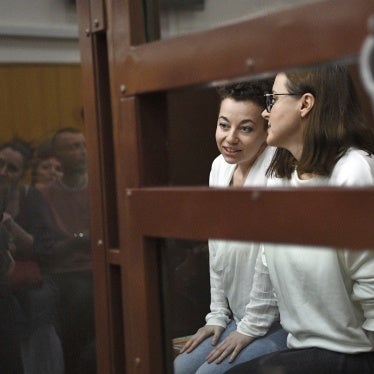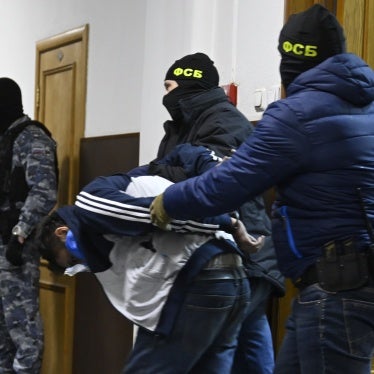(Brussels) – As Lithuania takes over the European Union’s rotating presidency it should lead by example, meet its legal obligations, and reopen its investigation into its own complicity in CIA secret prisons, US enforced disappearances, and alleged torture, Human Rights Watch and the Vilnius-based Human Rights Monitoring Institute said today.
On July 1, 2013, Lithuania starts its six months as the EU’s rotating presidency, the first Baltic state to hold that post.
“Lithuania is betraying the fundamental principles of human rights that underline the European Union by refusing to investigate serious allegations of human rights crimes, such as disappearances and torture,” said Lotte Leicht, European Union advocacy director at Human Rights Watch. “The country holding the EU’s presidency should have the courage and leadership to confront wrongdoing and make amends.”
Overwhelming evidence from the United Nations, Council of Europe, European Parliament, media, and human rights groups, as well as Lithuania’s own criminal investigation, confirms the existence of two CIA secret facilities in Lithuania as part of the global web of so-called black sites that the US used illegally to hold people suspected of links to terrorism, from roughly 2001 to 2006. Lithuanian airports and airspace were also used for CIA-related flights.
In 2010, Lithuania opened a criminal investigation into illegal detentions and transfers by the CIA in Lithuania from 2004 to 2005, but closed it after one year. In September 2012, the European Parliament called on Lithuania to reopen the investigation based on new evidence indicating that the CIA had transported a terrorism suspect from Morocco to Lithuania in February 2005. Lithuania refused.
The US has apparently failed to provide Lithuania with requested information about CIA activities and has refused to hold its own criminal investigations. But Lithuania has more than enough information, including material in the public domain, to reopen the investigation, Human Rights Watch said.
Nevertheless, Lithuania refuses to look seriously at its role in illegal detentions and alleged torture that took place on its territory, Human Rights Watch said. The government admits that it collaborated with the CIA to build two facilities, and that CIA-related flights landed in Lithuania, but it has not addressed strong indications that those flights actually held detainees.
Lithuania has also refused to provide details about its closed investigation, citing the need to protect state secrets.
“The government is hiding behind alleged state secrets to prevent a genuine judicial inquiry,” said Dovilė Šakalienė, interim executive director at the Human Rights Monitoring Institute. “But more than ample information has reached the public domain to merit a continuation of the case.”
Lithuania has ratified the UN Convention against Torture, as well as the European Convention on Human Rights. These require the country to investigate thoroughly and effectively all allegations of serious human rights violations, and hold perpetrators accountable.
Lithuania is not the only European country to avoid proper investigations of complicity in the CIA renditions program. Eleven other countries – Denmark, Finland, Germany, Italy, Macedonia, Poland, Portugal, Romania, Spain, Sweden, and the UK – are also alleged to have taken part to various degrees. Of these, only Italy has prosecuted anyone in relation to the program – convicting two Italians and, in absentia, 23 US agents for the abduction of an Egyptian man.
The US government has failed to hold any CIA agents or senior officials accountable for the numerous, well-documented allegations of torture, ill-treatment, and unlawful renditions during the administration of George W. Bush, Human Rights Watch said. A few low-ranking military personnel have been sentenced to prison.
The US Senate Select Committee on Intelligence adopted a more than 6,000-page report on the CIA’s detention and interrogation program in December 2012. That report remains classified.
Where wrongdoing by Lithuania is proven, the government should compensate victims, Human Rights Watch said. Those held illegally and possibly tortured in Lithuania have a right to redress.
“The unwillingness of Lithuania and other European Union governments to investigate their complicity in very serious US human rights crimes is a stain on its collective reputation,” Leicht said. “How can the EU urge others to shine a light on abuses if its own member states are unwilling to do the same?”
Background
The first reports of a CIA-run prison in Lithuania emerged in August 2009 from the US-based ABC News, which reported that Lithuania had hosted at least one secret prison holding as many as eight high-value detainees up to 2005. CIA planes made repeated flights into Lithuania during that time, ABC news said, citing former CIA officials.
The Lithuanian parliament, the Seimas, opened a partial inquiry that proved inconclusive. In October 2009, President Dalia Grybauskaitė urged a deeper probe. “If this is true, Lithuania has to clean up, accept responsibility, apologize, and promise that it will never happen again,” she said.
Her comments apparently irked officials at the US embassy in Vilnius. “Grybauskaitė’s lack of political seasoning may be largely responsible for reviving an aging story that continues to lack substantiation,” one official wrote in a diplomatic cable released by Wikileaks. “Rather than help quiet a story that does not reflect favourably on Lithuania, her comments instead have suggested that there may be a kernel of truth to the allegation.”
Two weeks later, the Seimas mandated its Committee on National Security and Defense to open a full parliamentary inquiry. After interviewing 55 people, including former senior officials, the committee reported in December 2009 that the CIA had asked the Lithuanian intelligence service – the State Security Department (SSD) – for help to “equip facilities in Lithuania suitable for holding detainees.”
The committee mentioned two facilities suitable for holding detainees, called Project 1 and Project 2, which were later identified as a small building in Vilnius and a former horseback riding academy twenty kilometers outside of Vilnius. In addition, five CIA-related flights had landed in Lithuania between 2003 and 2005, and others had used the country’s airspace, the committee found.
The Seimas committee failed to establish whether CIA detainees were transported into or through Lithuania, though. The report said it was “impossible to establish either the identity of the passengers or the purpose of the cargoes.”
In addition to recommending improved oversight of the State Security Department, the report said the Prosecutor General’s Office should investigate possible abuse of power by three former department officials: former Director General Mečys Laurinkus (1998-April 2004), former Director General Arvydas Pocius (April 2004-December 2006), and former Deputy Director General Dainius Dabašinskas (December 2001-August 2009).
The full Seimas approved the committee’s findings in January 2010, and the Prosecutor General’s Office opened a criminal investigation.
In February 2010, a joint report by four UN experts provided additional evidence, including flight data, that Lithuania was “integrated into the secret detention programme in 2004.” The findings of the Seimas committee can “in no way constitute the final word on the country’s role,” the experts said.
Despite these urgings, and the release of new information about a specific detainee, in January 2011 the Lithuanian General Prosecutor’s Office announced that it had closed its investigation, citing a lack of evidence and the need to protect state secrets.
President Grybauskaitė said later that Lithuania had done all it could with the investigation but that the work was “impeded by the United States’ refusal to share information.”
The European Committee for the Prevention of Torture, a Council of Europe treaty-monitoring body, asked the Lithuanian government about the methodology and findings of the investigation, but Lithuania refused to give details on what the prosecutor’s office had done or why it closed the case.
In response to the committee’s report, the government said the investigation had established the arrival and departure of CIA-related aircraft in Lithuania during the time in question. The CIA and State Security Department had also “implemented” Project 1 in 2002, and Project 2 in 2004. The government still insists that the allegation that CIA detainees were held in Lithuania is “not supported by factual data.”
Regarding the CIA facility at the riding school outside of Vilnius, Project 2, the government told the committee there was “no data on a connection between it and the keeping of detainees.” The real purpose of the facility, the government said, cannot be disclosed because it constitutes a state secret.
In September 2011, Amnesty International and the London-based organization Reprieve submitted additional information to Lithuania’s president and general prosecutor, including flight data showing the CIA had transported a high-value detainee named Zayn al-Abidin Muhammad Husayn (known as Abu Zubaydah) from Morocco to Lithuania in February 2005. The General Prosecutor’s Office refused to reopen the case.
In October 2011, Interights and partner lawyers brought a legal action on behalf of Abu Zubaydah before the European Court of Human Rights, charging Lithuania with responsibility in his “enforced disappearance, torture and ill-treatment at a secret detention facility in Lithuania.” The US government has admitted that Abu Zubaydah was waterboarded 83 times, but it is not known if any of that torture happened in Lithuania.
Also in 2011, the Vilnius-based Human Rights Monitoring Institute filed freedom of information act requests with the Lithuanian intelligence agency and other government bodies for the country’s participation in CIA renditions. Their requests were rejected on the grounds of national security.
In September 2012, the European Parliament called on Lithuania to reopen the investigation based on the newly available evidence. The General Prosecutor’s Office should also “substantiate with documentation” its claims that Projects 1 and 2 held no detainees, the European Parliament said.








